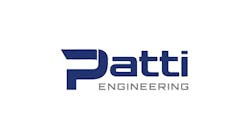UK PR consultancy CadenceFisher pulled off something of a minor coup last week by persuading arch-rivals Emerson, ABB, Siemens and Rockwell to present at the same session of its First Friday Club, so-called because it meets on the first Friday of each month. The successful formula, first established by CadenceFisher forerunner Fisher Marketing some years ago, gives three or four companies fifteen minutes each to present their new product, service or indeed any other bee in their particular bonnet to a diverse assembly of trade and technical hacks drawn from London and the surrounding area.
In return for the journoes' attention, the presenting companies are then granted the privilege of picking up the tab for the lunch and accompanying libations, usually at Ye Olde Cheshire Cheese in Fleet Street, but on this occasion the rather less traditional Wine Tun in the shadow of St Paul's Cathedral. The hacks get a good lunch and the chance of at least one reasonable story; the presenting companies, in return for swallowing their pride and sharing with potential rivals, get a better turnout than they would likely achieve at their own exclusive press reception, at roughly 25% of the cost.
Four quick presentations
First up last Friday was Richard Smith of Emerson's UK-based drives business Control Techniques with the latest addition to its Unidrive SP modular range of high- performance AC servo drives. Not a drive itself, the new SPM Power Selector exploits the modularity of the range by allowing individual modules to be rerouted automatically into different configurations. Smith highlighted two potential benefits of this new approach, one the ability to provide different levels of redundancy depending on the criticality of a specific application, the other to enable the same drives to be reconfigured to meet different requirements and hence to reduce the total number of drives required in such complex applications as container handling cranes.
Complementing Smith's presentation was ABB's Steve Ruddel who introduced a new "Motor Advantage" program aimed at bringing home to industry the true cost of motors. Among the startling statistics he produced was the revelation that while motors typically have a design life of 20 years or more, most are rewound in less than five. As a result the UK rewind industry is twice the size of the new motor market. With some 65% of all energy in industry being consumed by electric motors, Ruddel's message was that replacement with new high-efficiency motors is almost always a better choice in both economic and environmental terms than rewinding. More contentiously still, he suggested that replacing existing motors even before they need a rewind is an almost equally attractive option.
Third into the fray was Tony Druery with an explanation of how Siemens plans to help the water industry address the problems resulting from its diversity of legacy SCADA systems. He cited the case of one UK water company currently running 19 different SCADA products under eight different operating systems across a total of 90 sites. The most critical result, he argued, was a total absence of consistency of data and a consequent lack of trust in their systems among operators.
Siemens' solution is its high level PVSS – Enterprise SCADA offering which can be used to provide an overarching supervisory layer above existing SCADA and DCS offerings including both Siemens' own PCS7 and WinCC products and other third-party offerings and to provide higher level integration with the enterprise level, an arrangement which inevitably brought to mind comparisons with, for example, InFusion. Current battle honors for PVSS include most notably the Large Hadron Collider at CERN.
Finally, and still with a watery theme, John Gooday regaled the assembled company with an introduction to Rockwell's new water and waste water industry initiative which is spearheaded by a new consultancy service for the sector. Rather than focusing on specific products, the aim is to enable water industry clients to reduce their project life cycle and operational costs while enhancing regulatory compliance in a three-way alliance between Rockwell, its integrator partners and its water industry customers.
If the First Friday formula has a weakness, it is perhaps the limited opportunity to question the presenters. It would, for example, have been useful to have at least had the opportunity to judge Tony Druery's reaction to any mention of the word "Stuxnet.’’ As it was, and despite the promise of a Q&A session at the end of the four presentations, it was straight on to what some might have considered the serious business of the afternoon. Still, where else can you get four thought-provoking presentations in an hour – and a decent lunch to boot!


